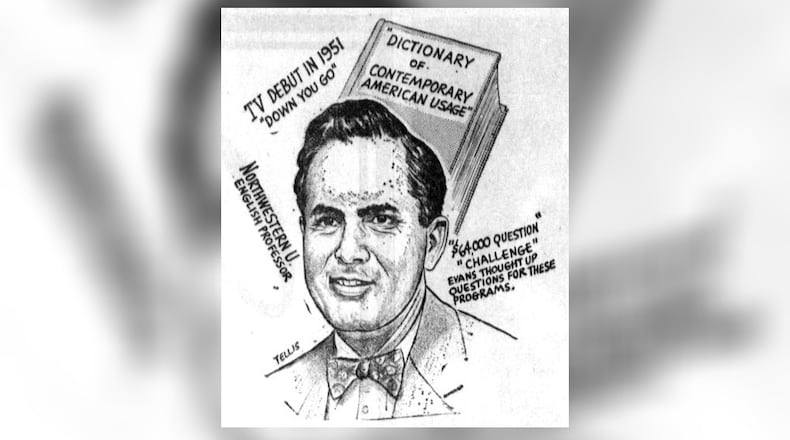Born in Franklin in 1904, Evans spent much of his early life in the area before starting his higher education path at an early age.
From there, Evans became one of the most beloved professors in Northwestern University history and the man behind one of the most popular television shows of the day, The $64,000 Question.
Education
Evans entered Miami University at the age of 15 and graduated in 1924 before going on to receive his Master’s degree from Harvard.
He returned to Miami University after Harvard and taught English from 1925 to 1928.
From 1929 to 1931, Evans became a Rhodes Scholar at University College in Oxford, England. Back at Harvard in 1932, Evans received a Ph.D. in English Philology.
Northwestern University
Evans became a professor of English at Northwestern University after graduation from Harvard in 1932.
According the the Northwestern website, “He was an incredibly popular instructor and remained at Northwestern until his retirement in 1974.” By then he had taught three years past the school’s mandatory retirement age of 68.
One of his courses, Introduction to Literature, became extremely popular, enrolling more students than any other course offered at the university.
Television
Outside of working at Northwestern, Evans also worked in the television industry.
Over the years, Evans hosted a number of shows, including Majority Rules, the game show Down You Go, a panel discussion show called Of Many Things and a show about English grammar, The Last Word, in which viewers would submit questions (up to 7,000 a week) about punctuation and spelling and other literary-related topics.
To work on these programs, Evans often had to travel to New York on weekends.
Evans was also became known as the expert behind the questions on the show The $64,000 Question and it’s companion show, The $64,000 Challenge.
How did he come up with the questions? Evans wrote the questions (for 24 categories), two days a week from his home library. He would then fly to New York where the show’s producer would revise and rephrase them as needed. The questions would go into individual envelopes, marked with a code and then locked away in a bank vault.
At one point the show was caught in a rigging and cheating scandal, but Evans was cleared of any wrongdoing or involvement.
Evans received a Peabody Award in 1957 for excellence in broadcasting for his CBS series The Last Word.
An inscription on the award said, “It is entertainment and public service — made so by the wit, charm, and erudition of Bergen Evans, John Mason Brown, and their distinguished guest panelists. This sparkling weekly discussion of words, the basis of all understanding and progress, makes it clear that learning can be fun, and that educational programs do not have to be dull.”
Writing
Evans wrote many short stories and books while also working at Northwestern.
He was also a feature writer for the magazine, The American Mercury, for which he also had a column titled, “The Skeptics Corner.”
Evans co-wrote a book, A Dictionary of Contemporary American Usage, with his sister Cornelia. The book, which took them 10 years to write, inspired his television show, The Last Word.
Evans wrote two books on one of his favorite subject, skepticism. The Natural History of Nonsense was published in 1946 and The Spoor of Spooks and Other Nonsense was published in 1954.
Other works accredited to Evans include the books Comfortable Words, Dictionary of Mythology, Dictionary of Quotations, Fifty Essays, The Psychiatry of Robert Burton, The Word-A-Day Vocabulary Builder, Your Car is Made to Last and more.
Personal life
Evans was the third child of Rice Kemper and Louise Cass Evans, who had a total of six children.
His father was a fourth generation doctor and diplomat who moved the family to England when Evans was 4. He was sent back to Franklin during World War I and lived with his aunt there.
Evans married Jean Whinery in 1939. They had two sons, Derek and Scott.
He died February 4, 1978, in Highland Park, Illinois.
About the Author





